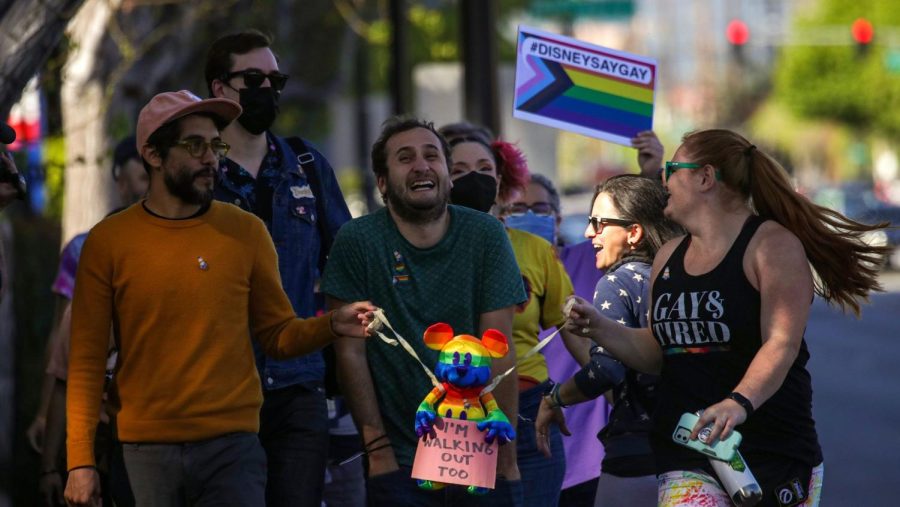Disney and the ‘Don’t Say Gay’ bill
On February 24, 2022, Florida Governor Ron DeSantis signed HB 1557, a law that many activists have dubbed the ‘Don’t Say Gay’ bill. The bill forbids public school teachers in Florida from teaching about LGBTQ themes or issues to children in third grade or younger. Any discussions from that age on have to be deemed “age appropriate.”
In addition, it allows and even encourages parents to sue the school if they do not like the content being taught and also forces school counselors and teachers to tell parents if their child is questioning their own gender identity.
The bill is set to begin on July 1, 2022.
The outcry was immediate. LGBTQ activists across the country immediately began protesting and speaking out against the bill.
Enter Disney.
Due to Disney headquarters being in the heart of Florida, many people expected the corporation to respond. Disney sells pride-themed merchandise, produces shows with LGBTQ themes, and in 2019, even hosted a pride parade.
However, on February 24th, when the bill passed in the Florida House of Representatives, Disney stayed silent.
The move is not completely surprising.
For years, Disney has toed the line, stating that they are supportive of the LGBTQ community while doing very little to actually uplift and help.
Over the years, any gay representation in their mainstream movies has been small, easy-to-cut-out scenes. In 2017, in the live-action remake of Beauty and the Beast, one of the characters, LeFou, briefly dances with another man. In 2019, Star Wars: Rise of Skywalker featured two women kissing in the background in one shot of the movie. And in 2020, Pixar’s Onward has a minor character mention her girlfriend in a throw-away line. Onward was subsequently banned in several countries, and the line was censored in places like Russia.
Also in 2020, Pixar released a short called Out featuring a gay man and his unique experience attempting to introduce his boyfriend to his family. Though Out alludes to progress, the short film is less than ten minutes long and was only released on Disney’s streaming service, Disney+.
When Disney failed to respond, many fans and employees were angry and called out the company. It was also revealed that Disney had donated thousands of dollars to major supporters of the ‘Don’t Say Gay’ bill.
A week later, in response to the backlash, Disney released a statement. In it, the company did not say anything about the ‘Don’t Say Gay’ bill. Disney simply alleged that “the biggest impact [Disney] can have…is through the content we produce…”
Employees of Disney were immediately outraged at the statement.
Their ire was not alleviated when Disney CEO, Bob Chapek released a memo to the company’s shareholders on March 9th. In his speech, Chapek promised to donate 5 million dollars to LGBTQ organizations like the Human Rights Campaign. Chapek also said that he would be meeting with Governor Ron DeSantis himself, to share Disney’s objections to the bill.
The Human Rights Campaign promptly declined to accept Disney’s donation. The organization asserted that they would not take any money from the company unless Disney committed to aiding in real change and prevention of harmful, anti-LGBTQ laws.
Shortly after, an open letter from Pixar employees was released, alleging that higher-ups at Disney had vetoed or cut any LGBTQ storylines Pixar wanted to make. The letter demanded Disney withdraw any monetary support of anti-LGBTQ legislators who created the ‘Don’t Say Gay’ bill.
On March 11th, Bob Chapek sent a message to employees of Disney, apologizing for not speaking out sooner against the ‘Don’t Say Gay’ bill and promising that he is “…an ally you can count on”.
Employees of the company were not impressed.
On March 15th, the walkouts began. From the 15th through the 21st, employees performed 15-minute walkouts during their breaks. Then on the 22nd, they did a much larger scale walkout, with employees in the parks and beyond protesting.
In their statement, employees demanded Disney stop donating to all politicians that aided in passing the ‘Don’t Say Gay Bill’, commit to creating and marketing positive LGBTQ content, and donate money to LGBTQ organizations.
Hundreds of employees protested across the country. Overall, the percentage of Disney employees that participated was small, but regardless, Disney took action.
A few days later, Disney released a public statement formally denouncing the ‘Don’t Say Gay’ bill and that it “should never have been passed and should never have been signed into law.” The company also stated that they were committed to ending the bill and that would work towards getting it removed.
The story does not end there, however.
Disney World in Florida operates as an “independent special district.” In the late sixties, when Disney purchased the land to make the theme park, the state of Florida created the Reedy Creek Improvement District. The area functions as a miniature government and has its own police force, fire department, and ambulance system. The park manages its own buildings, upkeeps and takes care of roads, and regulates resources like water and electricity. Disney taxes itself around 50 million dollars per year to fund all of these necessities. For decades, the setup has been mutually beneficial for the state and Disney.
However, in an act of revenge for Disney speaking out against the ‘Don’t Say Gay’ bill, Ron DeSantis has signed a bill to remove Disney’s special status. In his words, “I will not allow a woke corporation based in [Burbank] California to run our state.”
The bill will not go into effect until July 1, but it is currently being estimated that roughly 1 billion dollars of debt will be taken on by neighboring counties in Florida. In order to cover that, citizens could potentially see a 20% increase in property taxes. Aside from Disney now needing permission to build anything, there are few real consequences for the corporation. Most of the punishment will fall on regular tax-payers.
Despite Disney’s attempts at backtracking, the damage has already been done. The ‘Don’t Say Gay’ bill will go into effect in just a couple of months. As for the company itself, it seems that Disney has realized its attempts at pleasing both sides will no longer work, but what that means for the future of Disney and the content it creates remains to be seen.
Hi! My name is Cameron and I'm a senior. This is my third year writing for Wildezine and my second year as an editor. I'm mainly interested in how pop...







Eduardo Polón • May 25, 2022 at 5:08 pm
I appreciate and commend the care taken in delineating and explaining this issue with depth, clarity and maturity.